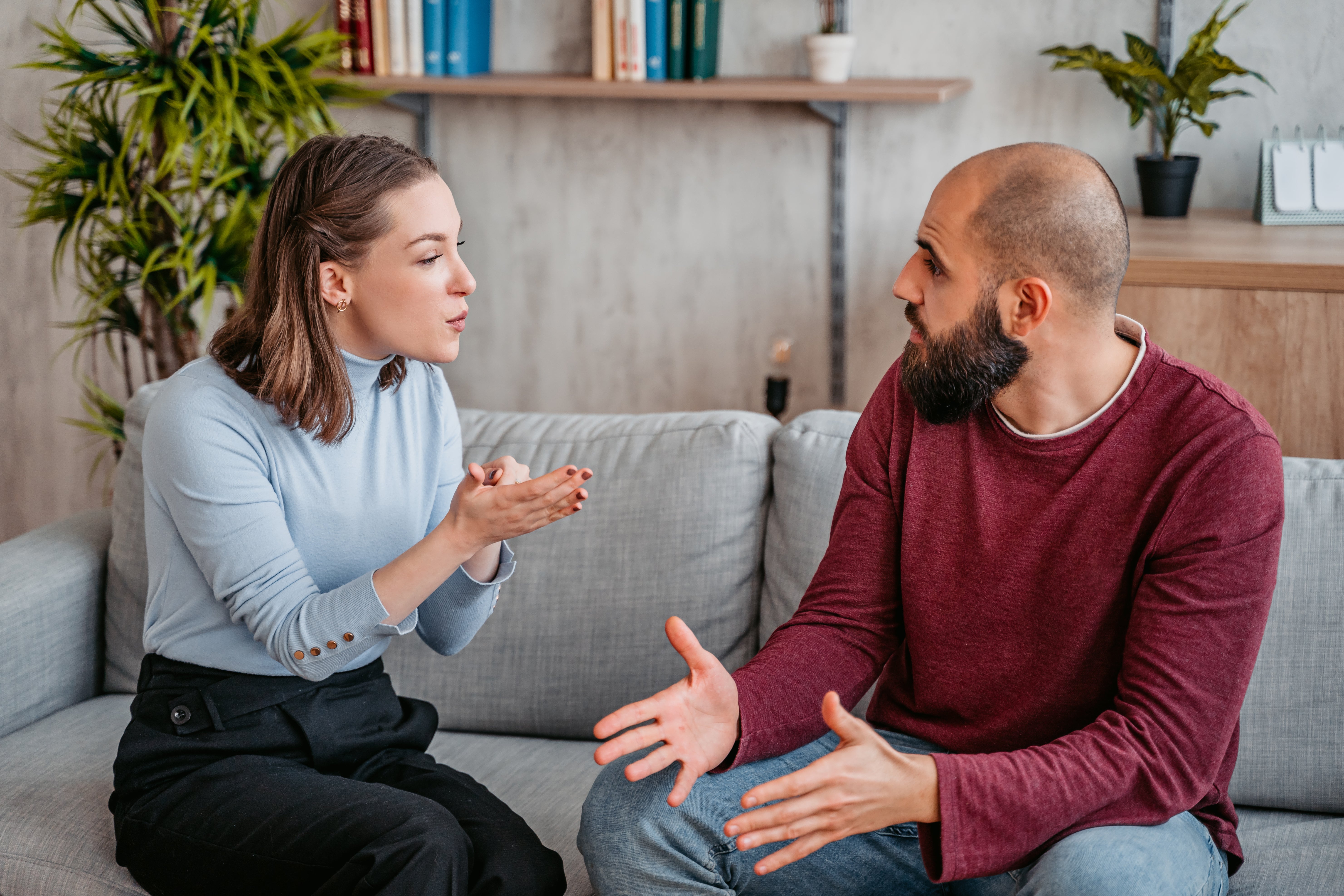The Independent's journalism is supported by our readers. When you purchase through links on our site, we may earn commission.
Psychologists share key tip for a lasting relationship. Do experts agree?
Psychologists say that the act of ‘turning toward’ your partner could strengthen your relationship. Amber Raiken speaks to experts about whether they agree and what this concept means


Your support helps us to tell the story
From reproductive rights to climate change to Big Tech, The Independent is on the ground when the story is developing. Whether it's investigating the financials of Elon Musk's pro-Trump PAC or producing our latest documentary, 'The A Word', which shines a light on the American women fighting for reproductive rights, we know how important it is to parse out the facts from the messaging.
At such a critical moment in US history, we need reporters on the ground. Your donation allows us to keep sending journalists to speak to both sides of the story.
The Independent is trusted by Americans across the entire political spectrum. And unlike many other quality news outlets, we choose not to lock Americans out of our reporting and analysis with paywalls. We believe quality journalism should be available to everyone, paid for by those who can afford it.
Your support makes all the difference.For decades, psychologists have examined how relationships operate and what the key could be to making them last. After studying couples for more than 50 years, Dr John Gottman and Dr Julie Schwartz Gottman, co-founders of The Gottman Institute and Love Lab, have pinpointed what they believe is the answer to making a relationship successful: The act of turning towards your relationship.
No, this isn’t simply facing your partner during a conversation. In an article published by CNBC earlier this month, the Gottmans said that, when couples turn toward each other, they are interacting with their “bids for connection”. These bids can range from help with a phone call to wanting to engage in a deep conversation about your relationship. In response to these bids, you “turn towards” your significant other by “acknowledging them and engaging with their attempt to connect”.
They describe failing to do this, or “turning away”, as “actively ignoring or just not noticing [your partner’s] attempt to connect” and “turning against” as “irritably or angrily shutting” them down.
The Gottmans also specified ways to practice turning towards your relationship, including a 10-minute check-in at some point of the day where neither you or your partner will be interrupted. Couples can also consider small moments, like eye contact, smiling, or simply saying: “Good morning,” as windows of opportunity for connection.
The pair cited a lab study from their work which analysed couples who’d stayed together for six years. They found that these couples would turn towards each other at least 86 per cent of the time. The couples they examined who’d gotten divorced only turned towards each other 33 per cent of the time.
Is turning towards your relationship the hack that will make it successful? Well, we spoke to psychologists to get their take and to see if they agree with the Gottmans, who have been married for more than 35 years.
Psychotherapists Katie McKenna and Helen Villiers, who are the hosts of the UK-based In Sight podcast, both said that turning towards your relationships means that you’re creating a space to really hear your partner. It also gives you the chance to discover if and how your partner’s current thoughts are connected to old feelings, potentialy ones they first felt years ago.
“It’s to be able to shift gears and kind of go: ‘This might not be about me, this might be something else,’” Villiers told The Independent. “When we’re talking about turning towards, we’re acknowledging those unmet needs from childhood that are sticking out in this current situation. We’re listening to what our partner is experiencing, but from our behaviour, even though the intention is not the same. There is an impact that feels the same as an unmet need from childhood.”
Villiers further explained that when you understand your significant other through this lens, you’re validating them and helping them feel like they’re in a trustworthy partnership.
McKenna agreed and emphasised how turning towards your relationship allows you to look at a situation through your partner’s point of view.
“It’s getting you to stand in my shoes and imagine what this must be like for me,” she explained. “Look through my window and see what I’m looking at. Even if my voice is elevated or my emotion is expressed, I want you to acknowledge that.”
But, despite how much you may acknowledge your partner, it also has to be reciprocated and your needs need to be fulfilled too.
“A lot of people look at it like: ‘Well am I doing this?’ And that’s really important if you’re doing that,” McKenna said. “But it’s just as important that you are also receiving this from your partner. Are they trying to make a bid for connection? Are they trying to see things from your perspective? Are they giving you space to be heard? Are they giving you space to share your emotions?”
When those actions are reciprocated, the emotional connection that comes from turning towards your relationship can ultimately strengthen the physical aspect since you both feel like you’re being seen.
“I’m able to be vulnerable with you and share my feelings,” McKenna added. “Which is creating a deeper emotional connection, which then leads to all other aspects of intimacy, including sexual intimacy.”
Villiers echoed the sentiment, explaining that this improvement in your physical relationship can become another layer that helps your emotional connection. More specifically, she referenced the neuroscience behind intimacy and hormones released during sex, such as oxytocin, which has been “associated with trust, sexual arousal and relationship building,” according to Mayo Clinic.
“Oxytocin is the bonding hormone and it’s absolutely released in massive amounts when you’re having sex with somebody, especially when you’re having an orgasm,” she explained. “So it intensifies the emotional connection when we are having a physical connection.”
Although much can be gained from acknowledging your partner, there are times where turning towards your partner may be misinterpreted, An example can be when you’re trying to use the relationship tool during an argument, which could do more harm than good.
“If you’re in conflict and one person is requesting a break by stepping away, a lot of times the other person will think they’re turning towards them by following and going: ‘No come back. We need to talk about this. I need to know how you’re feeling. I need to tell you how I’m feeling,’” McKenna said.
She highlighted the importance of respecting boundaries in a relationship and a partner’s need for a break. However, if your partner is the one requesting to step back, it is important that they make it clear that they’re returning.
“It’s their responsibility to reassure and say: ‘I’m coming back. So we’ll talk about this in half an hour or something,’” she told us. “They have to reassure you, so you’re not sitting in anxiety. Or else you’re petrified that you’re being emotionally abandoned and that they don’t love you anymore, so you continue to follow them.”
Villiers also made it clear that when you’re acknowledging your partner’s emotions, you should be setting a boundary in which you’re not being blamed for how they feel.
“We don’t have to rescue them from their emotions,” she explained. “For example, if someone feels bad because I said no to them, they’re allowed to feel bad. But it’s not for me to make them feel better about my no or my need even that I’m expressing. We’re allowed to say no to our partner, but we’re doing it without judgement, shame, or blame. And we’re allowed to hear our partner’s no with the same response.”
Ultimately, both McKenna and Villiers agree that the concept of turning towards can help couples last.
“Turning towards somebody is crucial to the relationship,” McKenna said before reiterating: “But only if it’s reciprocated.”



Join our commenting forum
Join thought-provoking conversations, follow other Independent readers and see their replies
Comments